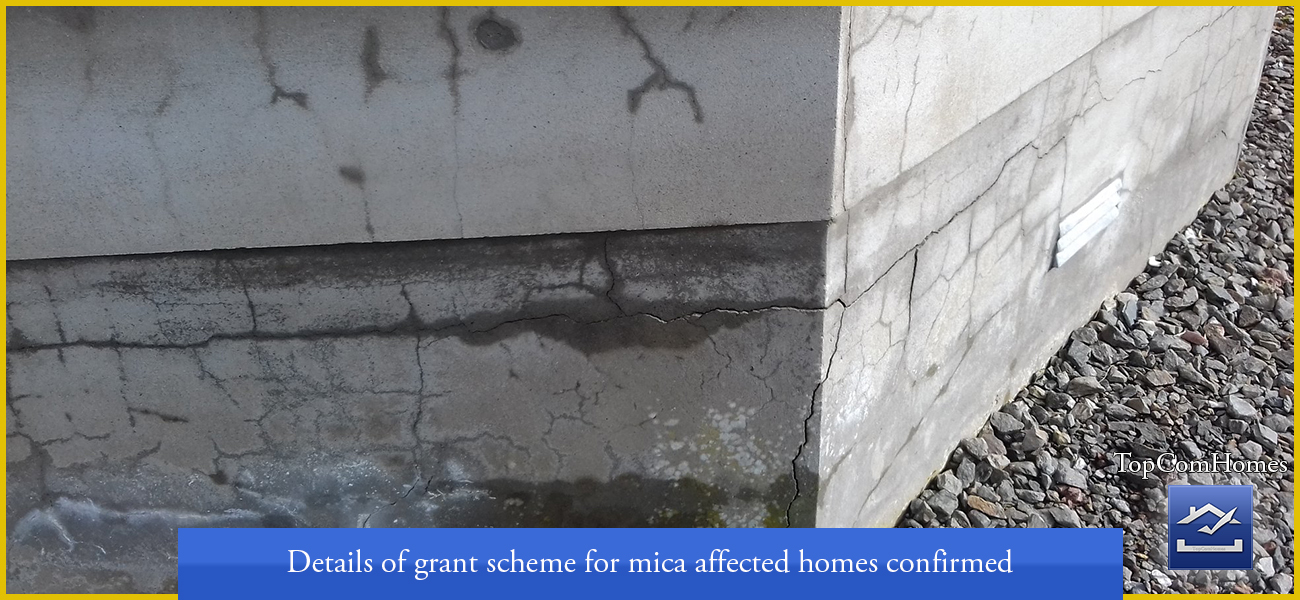
Ireland's Property News
Details of grant scheme for mica affected homes confirmed
Details of grant scheme for mica affected homes confirmed.
A Government grant scheme, expected to cost at least hundreds of millions of euro to rebuild houses affected by defective concrete blocks due to the mineral mica in Donegal, will give up to €275,000 to owners forced to demolish and rebuild the worst affected homes, RTÉ's Prime Time has learned.
An expert panel has already told the Government that up to 4,800 private Donegal homes are likely affected by damage.
Details of the scheme confirm that the total cost of a redress scheme to rebuild homes affected by the problem will run into at least hundreds of millions of euro and will be far greater than the total spend on the pyrite contamination of homes in Dublin and Leinster that led to a redress scheme in 2013.
Today, the Minister for Finance and Public Expenditure and Reform Pascal Donohue and the Minister for Housing Eoghan Murphy signed a statutory instrument regulating the new grant scheme.
Details of how it will work in practice were given to the Mica Action Group this afternoon, well over a year after an outline of it was approved.
In a briefing document seen by RTÉ's Prime Time, the Government confirmed the grant scheme will apply to owners of homes damaged due to defective blocks containing excessive amounts of the minerals, mica or, in the case of a small number of homes in Mayo, mica or pyrite.
Homeowners will be expected to pay 10% of the cost, with 90% coming from state funds. Donegal County Council and Mayo County Council will administer the scheme and can begin taking applications for it within weeks, the Mica Action Group believes.
Based on government approved grant costs released today, the minimum cost if all 4,800 homes were to get the lowest possible damage grant would be €264 million.
The maximum cost, if all the homes had to be demolished and rebuilt, would be €1.32bn. The likely overall cost is unknown, but experts have previously assessed that it will fall somewhere within the range of €300m to €2.5bn.
The degree of damage to homes varies, and while a significant number are seen as likely to require full demolition, there are four other grant categories that fall short of it, with maximum grants of €55,000, €75,000, €210,000 and €220,000 set, depending on the damage and extent of the demolition and rebuild.
A full demolition and rebuild will be granted €275,000.
Under the grant scheme, the owners of principal private dwellings can apply to Donegal County Council or Mayo County Council for a grant, with an engineer's report of the damage to their home. The local authorities assess and approve the maximum grant amount and after the works are complete and certified, the grant is paid.
The scheme allows for five different rebuild options, depending on the remedial options recommended in the engineer’s report.
Under the 'Financial Assistance Scheme for Remediation of Damaged Dwellings due to the Use of Defective Concrete Blocks’ scheme, homes with the lowest level of assessed damage will be grant aided to demolish and rebuild the outer leaf of affected walls at a cost of up to €55,000 or up to €75,000 per home, depending on the damage.
Homes that require demolition and rebuilding of external walls, including both outer and inner leafs (or walls), will be granted a maximum of €210,000, or €220,000 if demolition needs to be down to the foundation.
Where the entire house has to be demolished to its foundation and rebuilt, the grant will be €275,000.
The vast majority of the mica-affected homes are on the Inishowen Peninsula in Donegal, with most of the remainder in the county of Donegal, but a small number of houses in Mayo, affected by muscovite mica and pyrite, are also included.
In 2016, Prime Time revealed that bad building blocks, manufactured with too much mica, a mineral known to be harmful to concrete in them, and sold in concrete blocks in Donegal for a number of years, were not fit for purpose.
In 2017, a government-appointed expert panel found the blocks were defective and not fit for purpose, mainly due to the presence of the mica.
The Mica Action Group (MAG) today said it welcomed news that the scheme has finally been signed off.
Ann Owens Chair of MAG said: "MAG and affected homeowners have fought long and hard for this scheme and for justice for affected families over the last 8-12 years. Many are living in homes that have been condemned and are at risk of catastrophic failure. This could not have come a day too soon for any of them."
Eileen Doherty, the group’s spokesperson also said the campaign had been long and very emotional for the group and all of the families affected.
"People have had to leave their homes, marriages and family lives have been adversely impacted and many times those affected have questioned whether we would ever see this day", she said.
"MAG would like to dedicate this announcement today to one of our affected homeowners, Paddy Farren from Greencastle who had to move him and his family out of their Greencastle home due to this issue for fear for their safety. Sadly Paddy is no longer with us but we want to dedicate this to him memory for all that he contributed to the campaign.
"We hope that this news gives families some comfort in the knowledge that they can finally get their homes fixed and move on with their lives."
Contact The Mica Action Group (MAG) / MAG Facebook Page
Source : RTE 31/01/2020

Comments